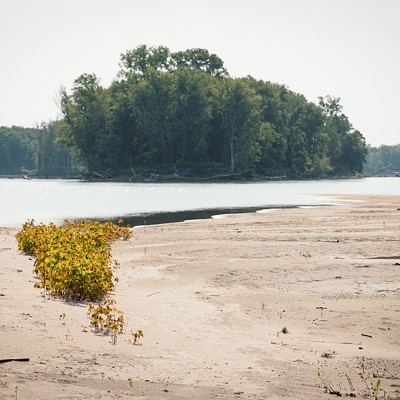A new study offers the first-ever "snapshot" of the plastic pollution in the Mississippi River — and it's pretty trashy.
The Mississippi River Plastic Pollution Initiative tracked debris near St. Louis and nine other cities along the Mississippi, from St. Paul, Minnesota to Greenville, Mississippi. Across three different periods from March 2021 to July 2022, volunteers logged a total of 174,868 items on their Debris Tracker apps.
That included this detailed set of detritus: cigarette butts (11,278), food wrappers (9,809), beverage bottles (6,723), foam fragments (5,747), hard plastic fragments (4,239), paper and cardboard (4,210), plastic bags (3,882), aluminum or tin cans (3,640), foam or plastic cups (3,260), and film fragments (3,149). A total of 75 percent of the trash logged was plastic.
And hey, St. Louis documented the most trash of all, with 28,537 items — although the study is quick to note that "St. Louis had the most items logged but is not necessarily the most littered." Perhaps we just have the most dedicated volunteers?
The study, sponsored by the Mississippi River Cities and Towns Initiative along with the United Nations Environment Programme North America Office and the University of Georgia, hopes to encourage ways to stop this type of pollution before it reaches the river. After all, the study notes, "reduction is the first line of defense" in decreasing litter in the environment. It follows a 2018 initiative to reduce plastic pollution in the Mississippi.
Recommendations include everything from installing more waste bins at "high-risk areas" along the river to increasing recycling options to doing further education around the hazards of cigarette butts. (As the study notes, cigarette filters are made of cellulose acetate, which is plastic, and "in addition to introducing plastic into the environment, cigarettes can also leach toxic chemicals into water bodies.")
But even if changes like that take a whole lot of time and political will to achieve, the study can boast making a short-term difference. It notes, "Of users who answered the survey, 73.2 percent reported that they cleaned up the items they tracked, resulting in over 47,000 items being removed from the environment as part of the initiative." That's good news indeed.
Subscribe to Riverfront Times newsletters.
Follow us: Apple News | Google News | NewsBreak | Reddit | Instagram | Facebook | Twitter | Or sign up for our RSS Feed
75 Percent of Trash in the Mississippi River Is Plastic, Study Finds
And that includes a whole lot of cigarette butts with their plastic filters

The Mississippi River, photographed as part of a five-day trek from Hannibal to Alton.
MATT WYCZALKOWSKI













